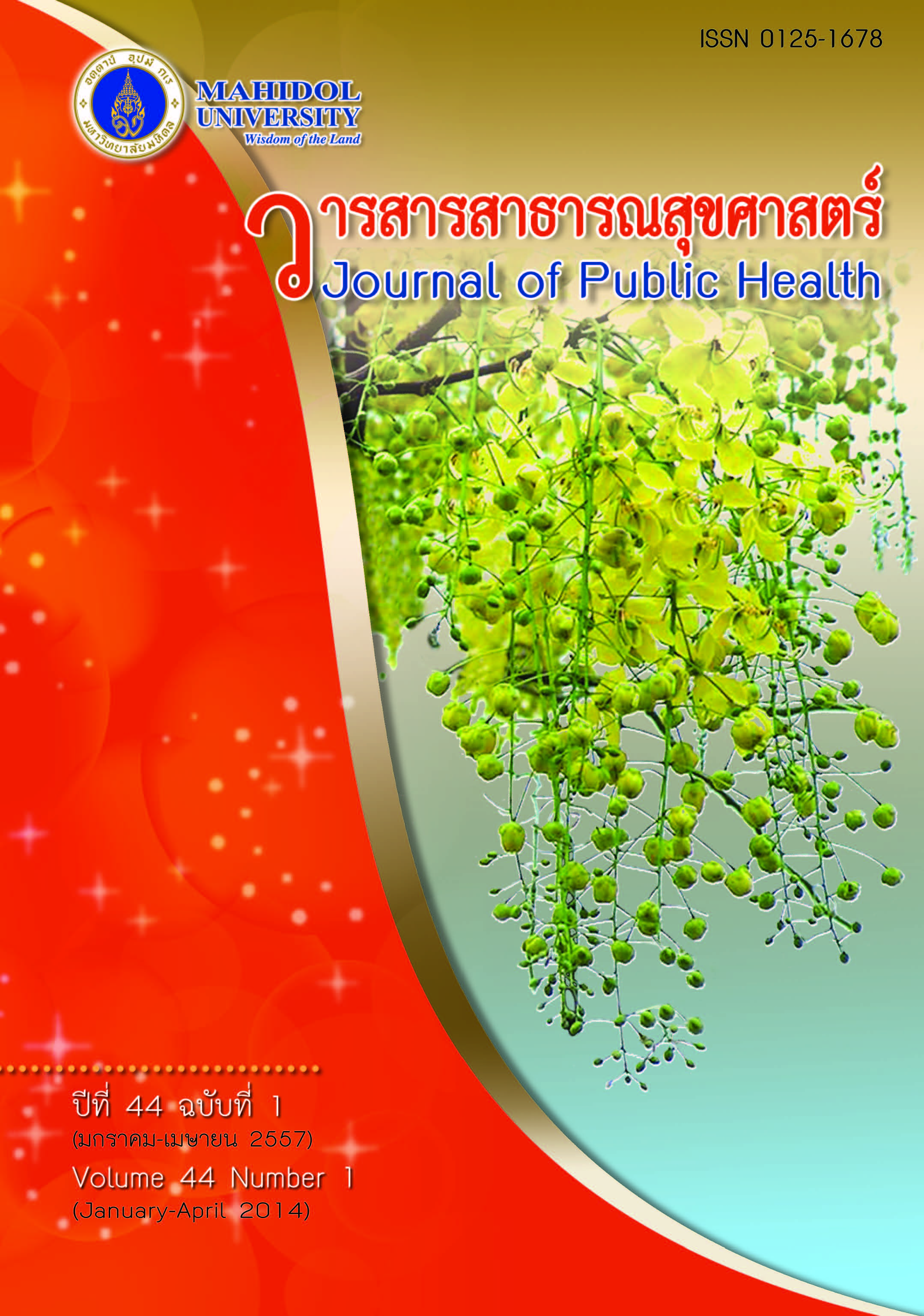บทบาทของแรงจูงใจในความสัมพันธ์ระหว่างภาวะซึมเศร้า การดูแลตนเอง และการควบคุมระดับน้ำตาลในเลือดของผู้ป่วยเบาหวานชนิดที่ 2 ณ โรงพยาบาลตติยภูมิแห่งหนึ่งในกรุงเทพมหานคร
Keywords:
แรงจูงใจ, ภาวะซึมเศร้า, การดูแลตนเองเกี่ยวกับเบาหวาน, ผู้ป่วยเบาหวานชนิดที่ 2, การควบคุมระดับน้ำตาลในเลือด, motivation, depression, diabetes self-care, type 2 diabetes patients, glycemic controlAbstract
บทคัดย่อ
ศึกษาภาคตัดขวางโดยมีวัตถุประสงค์เพื่อทดสอบความสัมพันธ์ระหว่างภาวะซึมเศร้าของผู้ป่วยเบาหวานชนิดที่ 2 กับ 1) การดูแลตนเองเกี่ยวกับเบาหวาน โดยส่งผ่านแรงจูงใจในการดูแลสุขภาพ และ 2) การควบคุมระดับน้ำตาลในเลือด โดยส่งผ่านการดูแลตนเองเกี่ยวกับเบาหวาน ประยุกต์ใช้แบบจำลองข้อมูลข่าวสาร-แรงจูงใจ-ทักษะพฤติกรรมการดูแลตนเองเกี่ยวกับเบาหวาน สุ่มตัวอย่างแบบมีระบบ โดยสัมภาษณ์ผู้ป่วยเบาหวานชนิดที่ 2 อายุตั้งแต่ 35 ปีขึ้นไป จำนวน 500 ราย ของโรงพยาบาลตติยภูมิแห่งหนึ่งในกรุงเทพฯ และเก็บผลการตรวจเลือดจากเวชระเบียนผู้ป่วย เก็บข้อมูลทั่วไป ภาวะซึมเศร้า ข้อมูลข่าวสาร (ความรู้เกี่ยวกับเบาหวาน) แรงจูงใจส่วนบุคคล (ทัศนคติเกี่ยวกับเบาหวาน) แรงจูงใจทางสังคม (การสนับสนุนทางสังคม) ทักษะพฤติกรรมสุขภาพ (สมรรถนะในตนในการดูแลตนเองเกี่ยวกับเบาหวาน) และพฤติกรรมสุขภาพ (การดูแลตนเองเกี่ยวกับเบาหวาน) ใช้การวิเคราะห์สมการโครงสร้างเพื่อทดสอบและทำนายเส้นทางความสัมพันธ์ ผลการศึกษาพบว่า แบบจำลองที่มีการปรับแก้ไข สามารถอธิบายความสัมพันธ์ระหว่างภาวะซึมเศร้า การดูแลตนเองเกี่ยวกับเบาหวาน และการควบคุมระดับน้ำตาลในเลือดของผู้ป่วยเบาหวานชนิดที่ 2 ได้ ภาวะซึมเศร้ามีความสัมพันธ์โดยตรงทางลบต่อการดูแลตนเองเกี่ยวกับเบาหวาน (p <0.01) และทางอ้อมต่อการดูแลตนเองเกี่ยวกับเบาหวาน โดยส่งผ่านทัศนคติเกี่ยวกับเบาหวาน และการควบคุมระดับน้ำตาลในเลือด โดยส่งผ่านการลดลงของการดูแลตนเองเกี่ยวกับเบาหวาน ผู้ป่วยเบาหวานชนิดที่ 2 ที่มีภาวะซึมเศร้าควรได้รับการส่งเสริมให้มีทัศนคติที่ดีเกี่ยวกับเบาหวาน และได้รับความช่วยเหลือจากผู้ดูแลและเจ้าหน้าที่อย่างสม่ำเสมอ
Role of Motivation in the Relationship between Depression, Self-Care, and
Glycemic Control of Type 2 Diabetes in Patients Attending a Tertiary Care Hospital, Bangkok
ABSTRACT
This cross-sectional study aimed to examine the relationship between depression in type 2 diabetes mellitus (T2DM) patients with 1) diabetes self-care via motivation, and 2) glycemic control via diabetes self-care. The Information-Motivation-Behavior Skills model of Diabetes Self-care (IMB-DSC) was the framework applied to this study. Five hundred T2DM participants aged >35 years from a tertiary care hospital in Bangkok were systematically recruited and interviewed using structured questionnaires. Information collected included blood test results from medical records, general characteristics, depression, information (diabetes knowledge), personal motivation (attitudes towards diabetes), social motivation (social support), health behavioral skills (diabetes self-efficacy), and health behavior (diabetes self-care). Structural Equation Modeling (SEM) was used to test predicted pathways. A trimmed relationship model explained the relationships between depression, diabetes self-care, and glycemic control. Depression was directly, negatively related to diabetes self-care (p <0.01), and indirectly related to decreased diabetes self-care via decreased attitudes towards diabetes and glycemic control. Those T2DM patients suffering depression should be assisted to develop more positive attitudes towards diabetes through the support of their caregivers and health team.
Downloads
Issue
Section
License
Creative Commons License CC-BY-ND


